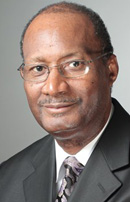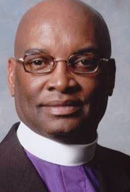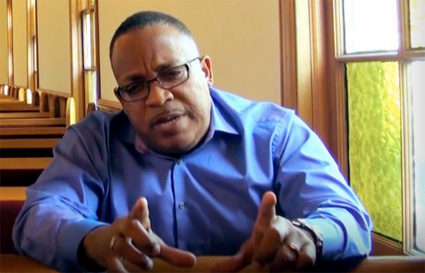WASHINGTON (RNS)—Since the Supreme Court ruled same-sex marriage constitutional, Jerry Young has been in a quandary.
As the president of the National Baptist Convention, USA, a predominantly African-American denomination, he is grappling with a new reality—how to respond to the specter of discrimination against gays.
 Jerry YoungWhile he doesn’t support gay marriage, the refusal of some religious bakers and florists to provide services to gays prompts memories of racially segregated hotels and restaurants.
Jerry YoungWhile he doesn’t support gay marriage, the refusal of some religious bakers and florists to provide services to gays prompts memories of racially segregated hotels and restaurants.
“On the one hand, you have to be sensitive to the fact that you do not want people to be victims of discrimination. That’s just an absolute fact; you just do not want that to happen,” said Young, who grew up in Mississippi in the civil rights era and is developing a position paper to guide National Baptist congregations on these issues.
“And on the other hand, there is this tension between what, as Christians, we believe God has called us to do, and what it appears to be, in some sense, what the culture seems to be doing.”
Majority oppose religious exemptions
Although some national black Baptist denominations and the Church of God in Christ oppose same-sex marriage, a new poll from the Public Religion Research Institute shows 63 percent of nonwhite Protestants object to religious exemptions in nondiscrimination laws.
Seventeen states have introduced legislation to create or alter state-level religious freedom restoration laws, some of which could affect same-sex marriages. Many Voices, a pro-LGBT group that works with black churches, said it hopes to influence legislators crafting those bills.
“Voices of faith leaders will be required to hold in balance the highly valued religious liberty we enjoy along with freedoms and protections for LGBT persons and their families,” said Cedric Harmon, co-director of Many Voices.
Not all African-American clergy oppose same-sex marriage, but many oppose laws that would allow legal discrimination against a group of people.
 George Battle Jr.“I know what it’s like to be discriminated against, and our people do, so I don’t want them to be discriminated against,” said George Battle Jr., senior bishop of the African Methodist Episcopal Zion Church, which opposes same-sex marriage. “If their money is green and you’re taking green money, I think you should take it all.”
George Battle Jr.“I know what it’s like to be discriminated against, and our people do, so I don’t want them to be discriminated against,” said George Battle Jr., senior bishop of the African Methodist Episcopal Zion Church, which opposes same-sex marriage. “If their money is green and you’re taking green money, I think you should take it all.”
But T. DeWitt Smith Jr., an Atlanta pastor and co-chair of the National African American Clergy Network, said he doesn’t think owners of mom-and-pop establishments should be equated with the segregationists of the past.
“The smaller groups have to grapple with their own consciences,” said Smith, former president of the Progressive National Baptist Convention, noting he was stating his personal opinion.
While some businesses may make that choice based on religious belief, “I don’t really equate that with the denial of hotel space based on color, ethnicity.”
Should have right to deny services
Talbert W. Swan II, a Church of God in Christ pastor in Springfield, Mass., agreed the church-run bakery down the street from his congregation should have the right to deny its services to a gay couple.
“So, if someone walks into the New Hope Bakery and said, ‘We wanted you to bake a cake for a same-sex marriage ceremony,’ I think they should have every right to say, ‘No, we won’t bake that cake,’” he said. “They should have every right to refuse to bake a product that’s going to be associated with something that violates their religious belief.”
But Swan said a for-profit corporation that serves the general public should not have an exemption.
 Terence Leathers (Image: Many Voices video)To Swan, the history of enslavement of African-Americans cannot be compared to LGBT struggles.
Terence Leathers (Image: Many Voices video)To Swan, the history of enslavement of African-Americans cannot be compared to LGBT struggles.
“I don’t think it’s comparing apples to apples,” he said. “The history does not compare, and to me, it’s quite insulting to try to make that connection.”
Terence Leathers of Clayton, N.C., unsuccessfully lobbied the North Carolina legislature, which passed a law allowing magistrates to refuse to perform a same-sex marriage ceremony. He believes magistrates and bakers should not deny services to LGBT people, and he connects these issues to times when other discrimination was evident—like the nearby town that once had a welcome sign that read “This is Klan country.”
“It’s discriminatory and should not be tolerated,” he said.
But he admits to feeling like he’s a lone voice among black clergy in his rural area.
“There are people who may be for me, but they’re keeping it silent,” he said. “They don’t want to cause any trouble.”















We seek to connect God’s story and God’s people around the world. To learn more about God’s story, click here.
Send comments and feedback to Eric Black, our editor. For comments to be published, please specify “letter to the editor.” Maximum length for publication is 300 words.